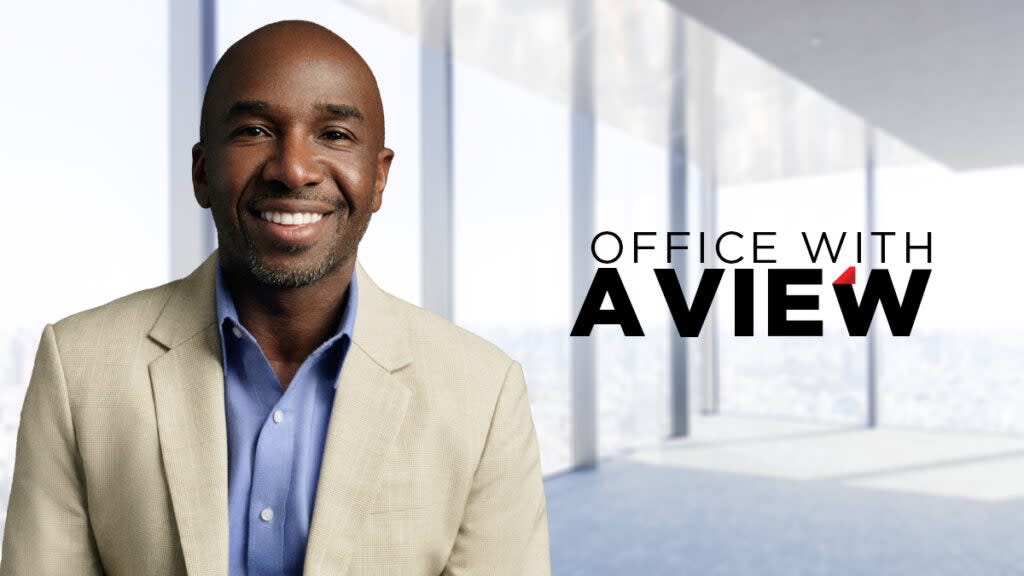SMAC’s Non-Scripted Head Urges Flexibility at Work: ‘You’re Going to Have to Rip the Plan Up’

Amid Hollywood’s double strikes and a recent resurgence of COVID-19, rolling with the punches is a necessary quality for those looking to enter the entertainment industry, according to FredAnthony Smith, who serves as head of nonscripted development at “BS High” producer SMAC Entertainment, which was co-founded by Constance Schwartz-Morini and Michael Strahan.
“Part of the job is planning, and being very detailed… but also knowing that as soon as you wake up the next day, getting ready to enact that plan, you’re gonna have to rip the plan up, because something’s gonna go wrong,” Smith told TheWrap for this week’s Office With a View. “At the very beginning of the day, something’s going to happen where you have to completely change your plan.”
It’s not just trying to guess when the guilds and studios might come back to the negotiating table or navigating a stubbornly persistent pandemic. Even something as simple as a delayed flight can derail schedules.
Smith’s problem-solving skills were put to the challenge while directing a feature about the Los Angeles-based Super Bowl during his time at the NFL, where he worked for 17 years before joining SMAC. The feature, which took place mid-pandemic, was set to host stars like Ice Cube, Snoop Dogg, Jay Leno, Drew Barrymore and George Lopez, until a surge of COVID cases threatened the league’s plans.
He called in “17 years worth of favors that had been stored up” among key industry leaders to figure out a solution.
“If you’re good at your job, you’re humble and you work hard, you’ll have people speaking for you in rooms that you’re not even in, that you don’t even know,” Smith said. “Your name is the biggest currency that you have. There’s nothing more valuable than your name — and if you have a good name, people will know it, people will respect it and, if they can, they can always help you out.”
Smith spoke to TheWrap about how he stays flexible in an ever-changing industry and offered advice for those looking to tap into sports for stories to tell.
This interview has been edited for length and clarity.
The strike has affected the whole industry as companies lean on unscripted shows. How have you been approaching that genre?
The last time there was a strike, there was definitely an uptick in studios, networks, streamers purchasing unscripted. There hasn’t been as much of an uptick, I think, as people in my business would have thought. At the same time, fortunately, we’re in a strong enough position going into the strike, where we had a number of things in production and development.
We’re storytellers at heart, so we’re going to continue to find ways to tell stories, and we’re going to continue to come up with new stories and to brainstorm. Nothing has really stopped with us, in terms of the machine. We’re still prepping as though tomorrow every network, every streamer in the business is going to need 100 shows.
Sports are also something companies are trying to leverage, even just through stories. How do you recommend companies looking to break into sports start?
The great thing about sports is that there are just so many different so many different stories that are out there. A lot of companies are realizing the innate power of sports — when you talk about unscripted and you talk about natural, inherent drama, sports is the original unscripted content. As companies are looking for content that may not be as expensive as what movies are costing these days, while also being able to tell great stories, sports is a great avenue to do that.
Sports, in many ways, is a reflection of society and has led to great societal shifts. Jackie Robinson broke the color barrier in baseball eight years before Martin Luther King Jr. came on the scene and led the Montgomery bus boycott. Sports gives storytellers opportunities to tell greater stories that aren’t necessarily tied to what’s happening between the lines.
What is something you’ve learned from the industry that you would like to pass on?
Persistence is key. It’s just getting up every day, and continuing to work and continuing to fight. Ray Lewis had a quote when he was playing in the league: “Being the champion isn’t easy — if it was easy, everybody would do it.”
So if it’s something that you’re truly passionate about, you have to know that it’s not going to be easy, and that you have to be willing to fight for it, and you have to be willing to go the extra mile for it. But also, whether it’s producers or people that are in development, it’s finding comfort in being uncomfortable.
The post SMAC’s Non-Scripted Head Urges Flexibility at Work: ‘You’re Going to Have to Rip the Plan Up’ appeared first on TheWrap.


